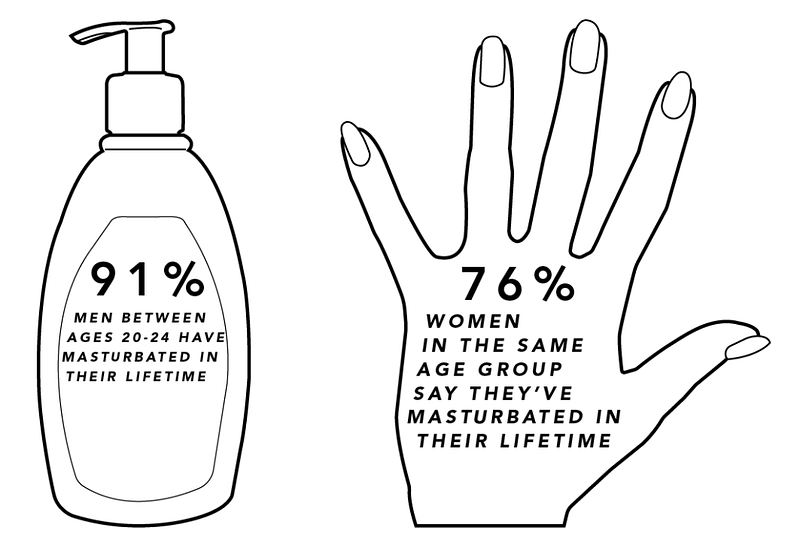Bate and Catch
STORY BY LILY JAQUITH
photo illustration by Rachel Brown | infographic by David Young Shin
The hunt to end stigmas of self pleasure
Masturbation. A word that could make a room full of sixth graders giggle and still bring silence to a college lecture hall.
Along with the occasional reflex to blush every time the word comes up is the assumption that men masturbate more than women.
The stereotype that women never masturbate and all men do appears to be just that, a stereotype. Ninety-one percent of men between ages 20–24 have masturbated in their lifetime, while 76 percent of women in the same age group say they’ve masturbated in their lifetime, according to a 2010 study done by The Journal of Sexual Medicine.
The 15 percent difference is a far cry from the assumption that women never touch themselves and men never stop.
DICTATED BY SOCIETY
Western’s Associated Students Sexual Awareness Center Coordinator Allie Moore is skeptical about statistics that convey any sort of difference in the number of men that masturbate compared to the number of women.
“I wonder if that number is just reported because women don’t want to talk about it, not that they’re not necessarily masturbating,” Moore says. “I think it’s a little of both.”
Sarah Covert-Bowlds, former AS Women’s Center Coordinator, feels the same way. She’s inclined to believe numbers are pretty even between men and women masturbating.
There are societal pressures could also be causing women to underreport.
Masturbation ties in with the idea that men have more sexual energy, says Ray Jacobsen, assistant coordinator of the AS Sexual Awareness Center.

This gives the impression that men think about sex all the time, so they have to masturbate more. The idea of women having a sex drive and masturbating gets left behind.
Sex education is also often designed for men, she says. So naturally it’s more comfortable for men to talk about it.
It’s almost expected that men masturbate early in their lives, says Danny Canham, former assistant coordinator for the AS Women’s Center. Men are expected to be more comfortable with their bodies, so it’s assumed they would masturbate.
Canham feels many women don’t even think of masturbation as a possibility until much later, he says.
Moore believes that men are taught to be far past the standard of sexuality, while women are taught to be far below it.
“Male sexuality is always accepted and rewarded by society,” she says.
Masturbating isn’t a requirement, Covert-Bowlds says. But it is harmful for women who find pleasure in masturbation to feel they’re the odd one out among female peers.
“The general view of female masturbation is that it can turn on men and that’s what it’s about,” Moore says. “I really hate that.”
For a woman there’s shame in being sexual, Moore says.
CHANGING THE NARRATIVE
Changing the language surrounding masturbation is the key to getting rid of the stereotype and making up the difference, Jacobsen says.
Moore believes part of the stereotype might come from the idea that people can’t masturbate when they’re in a relationship.
Women are expected to be there for their husbands, she says. There aren’t as many options for women to open up about their sexuality while promoting a sex-positive culture.
“No matter what decision you make [about sexuality] make it for you,” Moore says. “If you do it, own it and be happy about it.”
It’s important to remember masturbation is healthy for anyone, she says. It’s the safest form of sexual activity.
Open communication about masturbation makes it less of a big deal than it once was, Canham says.
Masturbation is important to many people, Jacobsen says, whether you’re a young person learning about your sexuality or someone much older who doesn’t have a partner anymore.
“If we work on making masturbation more of a topic for conversation and a more positive thing, then it might be the key to reversing sexual repression,“ she says.
“Sex for One: The Joy of Selfloving” by Betty Dodson explains that by creating a better dialogue around masturbation, people, especially women, are able to better ask for the kind of sex they want from a partner.
If women are more encouraged to masturbate, and know themselves, then communication can increase in sexual encounters with a partner.
Better sexual health education is essential to changing the stereotype, Canham says.
Through education and the changing views of society the assumption could change, Covert-Bowlds says. But it’s not going to happen anytime soon because this goes so far back.
By making this a safe topic, Jacobsen says, masturbation can become more approachable. Recognizing the barriers to talking about it is the first step.
